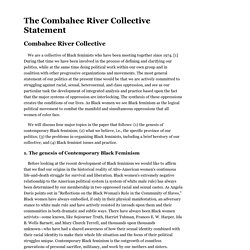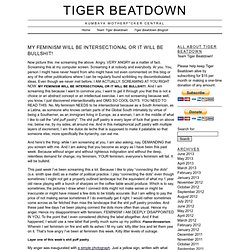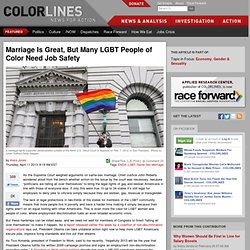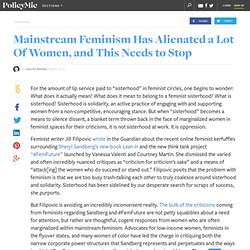

The Combahee River Collective Statement. We are a collective of Black feminists who have been meeting together since 1974. [1] During that time we have been involved in the process of defining and clarifying our politics, while at the same time doing political work within our own group and in coalition with other progressive organizations and movements.

The most general statement of our politics at the present time would be that we are actively committed to struggling against racial, sexual, heterosexual, and class oppression, and see as our particular task the development of integrated analysis and practice based upon the fact that the major systems of oppression are interlocking. The synthesis of these oppressions creates the conditions of our lives. As Black women we see Black feminism as the logical political movement to combat the manifold and simultaneous oppressions that all women of color face. 1. The genesis of Contemporary Black Feminism 2. 3. MY FEMINISM WILL BE INTERSECTIONAL OR IT WILL BE BULLSHIT! Now picture this: me screaming the above.

Angry. VERY ANGRY as a matter of fact. Screaming this at my computer screen. Screaming it at nobody and everybody. Solidarity is For Miley Cyrus: The Racial Implications of her VMA Performance. I've been thinking about this a lot, and i think that a big part of the problem is that for white people black culture has always been an excuse for rebellion, with the consequence that black culture can have very different meanings for whites.

For example, I read a rock critic compare blues to heavy metal. In a blues song, the critic wrote, when a black singer says "I'm a MAN," he is saying in the sense of both virility and also with the subtext that you shouldn't call him "boy. " When a white guy says that, it has just the sexual meaning. It would have been interesting if Miley had gone a different route - going all Liz Phair or even Courtney Love. Mariage pour tous, pour une autre stratégie politique. « Si les homosexuels se bornent à revendiquer leur liberté, cette demande seule ne sera pas révolutionnaire et on peut imaginer qu'elle entrera un jour dans le champ de la récupération par la bourgeoisie et du réformisme.

Ce serait aussi absurde que de vouloir aller vivre dans une île homosexuelle libre, en abandonnant le combat contre l'exploitation économique et l'illégitimité des structures bourgeoises » (FHAR, Tout, 23 avril 1971). Une proposition de loi encadrant l’ouverture du mariage civil aux couples de même genre a été présentée en Conseil des ministres et l’Assemblée Nationale est appelée à en débattre, en janvier 2013. Une promesse de campagne du nouvellement élu François Hollande commence donc à prendre forme.
Certes les contours de la loi restent pour le moment flous, mais il semble bien qu’une partie des promesses du candidat socialiste à l’élection présidentielle ne sera pas tenue. Marriage Is Great, But Many LGBT People of Color Need Job Safety. As the Supreme Court weighed arguments on same-sex marriage, Chief Justice John Roberts wondered aloud from the bench whether action on the issue by the court was necessary, because “politicians are falling all over themselves” to bring the legal rights of gay and lesbian Americans in line with those of everyone else.

If only this were true. In up to 34 states it’s still legal for employers to deny jobs to citizens simply because they are lesbian, gay, bisexual or transgender. Mainstream Feminism Has Alienated a Lot Of Women, and This Needs to Stop. For the amount of lip service paid to “sisterhood” in feminist circles, one begins to wonder: What does it actually mean?

Nous, féministes. Us and Them: On Helpless Women and Orientalist Imagery. The web is abuzz with talk of Mona Eltahawy’s latest entry, which made its way onto the front cover of Foreign Policy, ‘Why Do They Hate Us‘, the “war on the women in the Middle East”; reactions vary from unwavering support to venom-laced condemnation, and a multitude of other postures in between.

In the latest Foreign Policy feature, a part of their “sex edition”, Eltahawy laments that “they hate us”, an unashamed amalgamation directed towards men. She writes: “Yet it’s the men who can’t control themselves on the streets, where from Morocco to Yemen, sexual harassment is endemic and it’s for the men’s sake that so many women are encouraged to cover up.” Dear Mona Eltahawy, You Do Not Represent “Us” Author: Samia Errazzouki Posted April 24, 2012 When I first came across Foreign Policy’s recent “Sex issue” cover, I thought it was an attempt at blackface, but upon zooming in and reading the title of the article by Mona Eltahawy, my eyes were not fooling me.

Pour un féminisme sans orientalisme. En France, cette année, le 8 mars semble être devenu la journée des femmes... dans le monde arabe.

Le féminisme est-il voué à se soucier en priorité des autres femmes, ou des femmes des autres? En 1978, l’écrivain palestinien Edward Said développait aux États-Unis une analyse critique de l’orientalisme qui demeure d’actualité : en renvoyant l’Orient dans une altérité radicale, cette représentation savante a fonctionné dans l’Europe colonisatrice comme une opération de pouvoir d’autant plus efficace qu’elle se niait comme telle.